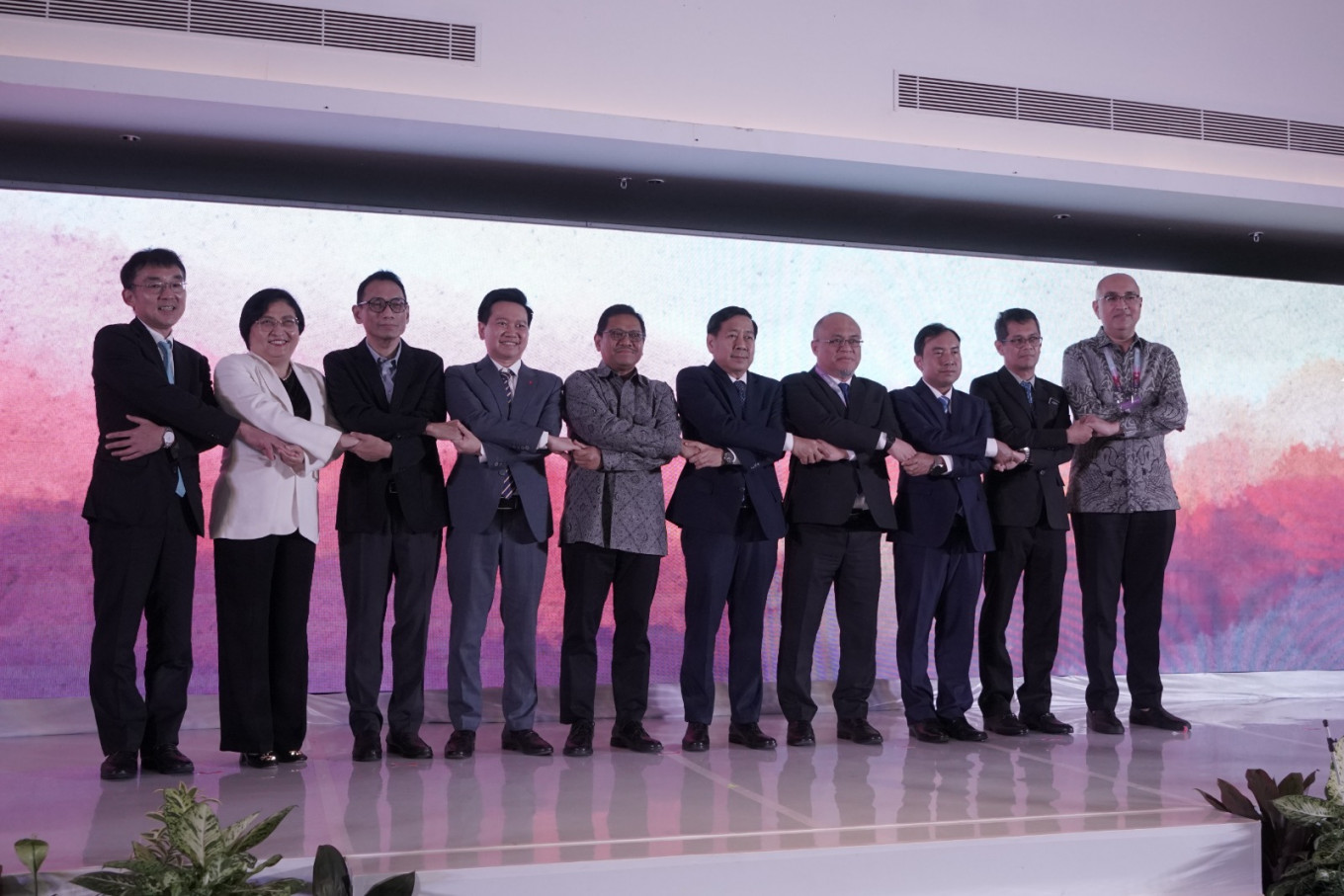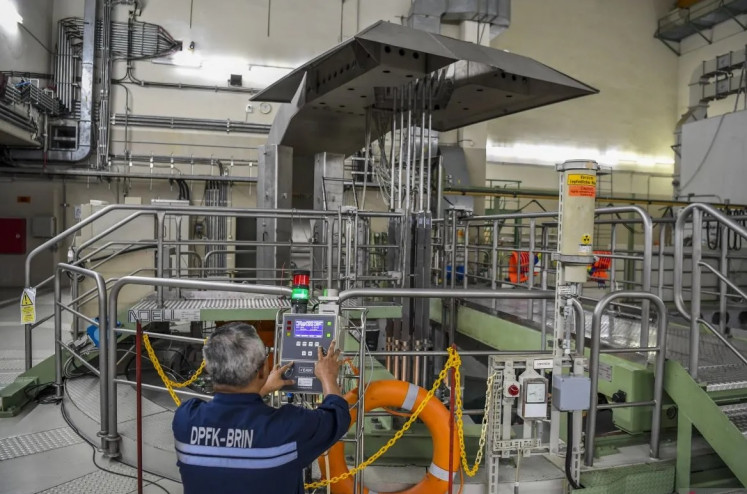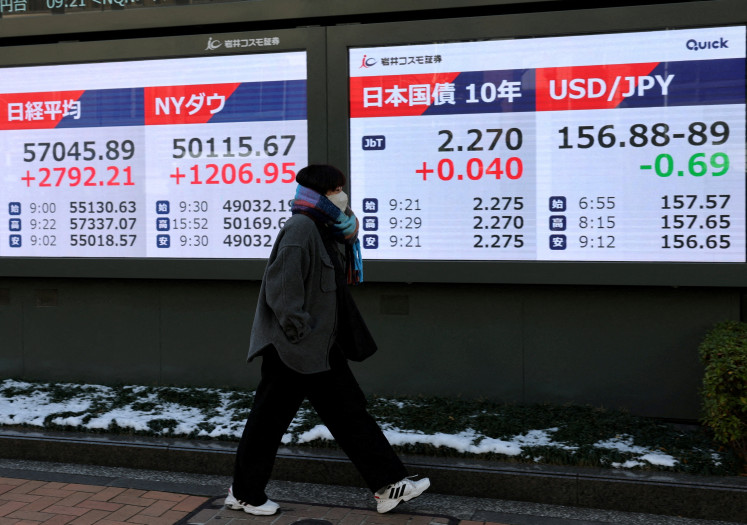Popular Reads
Top Results
Can't find what you're looking for?
View all search resultsPopular Reads
Top Results
Can't find what you're looking for?
View all search resultsBlue economy bodes well for ASEAN
Change text size
Gift Premium Articles
to Anyone
T
he blue economy, a new engine of economic growth, bodes well for the countries of the Association of Southeast Asian Nations (ASEAN) that are eager to achieve prosperity despite lingering challenges.
The Minister for National Development Planning/Head of National Development Planning Agency (Bappenas) Suharso Monoarfa said that most ASEAN member states were either struggling to exit from lower middle- income status, or to escape from the middle-income trap.
“Only Singapore and Brunei Darussalam are classified as high-income countries in ASEAN. Therefore, ASEAN needs a new engine of growth that can improve the people’s welfare even though the total ASEAN GDP grew by10.3 percent during the 2016 to 2021 period,” Suharso said in a recorded keynote speech prior to the launch of the Indonesia Blue Economy Roadmap, one of the main events of the ASEAN Blue Economy Forum Agenda in Belitung, Bangka Belitung Islands, on July 3.
Suharso highlighted the massive blue economy potential that ASEAN had, which needs to be utilized optimally.
More than 66 percent of Southeast Asia’s total area is covered by ocean and sea. “This comprises an area of 8.9 million square kilometers, which is approximately 2.5 percent of the total ocean surface area in the world,” he said.
“Moreover, trans-boundaries also present an avenue for developing a blue economy in ASEAN,” he said.
The minister added that Southeast Asia is home to 15 percent of the world’s fisheries, who employ approximately 625 million people in its related sectors. “Moreover, a blue economy can provide food, jobs, and water for the world’s most vulnerable communities. It generates between US$3 and 6 trillion and about 260 million jobs per year,” he said.
The Organization for Economic Cooperation and Development (OECD) estimated that the value added to the global economy output would double in 20 years from $1.5 billion in 2010 to $3 billion in 2030.
The blue economy that Indonesia is putting forward is the continuation of the ASEAN Leaders Declaration on Blue Economy, which was introduced in Brunei Darussalam in 2021 as a collective effort of ASEAN member states to mitigate the impact of COVID-19.
The ASEAN Leaders Declaration in 2021 reemphasized the blue economy and the need for sustainable, resilient, inclusive use and management and conservation of the ocean, sea and marine life, as well as coastal ecosystems for economic growth across various sectors such as fisheries, aquaculture, maritime transport, renewable energy, tourism, climate change and research and development, while improving human wellbeing and social equity. “Therefore, the intention makes ASEAN leaders’ blue economy targets clearer. It highlights ASEAN’s commitment to taking the lead on regional cooperation concerning the blue economy,” he said.
“Moreover, ASEAN views the blue economy as a multi-faceted, cross-cutting concept which facilitates resilience, inclusivity and sustainability,” he added. As holder of the 2023 ASEAN chairmanship, Indonesia is committed to delivering the ASEAN Blue Economy Framework as one of the economic goals of 2023.
Up to 645 guests participated in the Geoventure events, along with 288 guests during the main events and the launching of the Indonesia Blue Economy Roadmap and ASEAN Ministerial Panel: ASEAN’s View on Blue Economy.
Around 233 participants attended two other events, on the blue economy collaboration and blue finance.
According to Suharso, ASEAN has stepped forward in its efforts to develop a blue economy framework due to further economic integration in ASEAN. “The framework is designed to function in parallel with ASEAN’s vision 2045, the ASEAN strategy for carbon neutrality, the ASEAN Regional Plan for Combating Marine Debris and other ASEAN initiatives.
Global blended finance alliance
Suharso highlighted Indonesia’s success in initiating the global blended finance alliance in Bali 2022 to mobilize new sources of developing financing from non-government actors under Indonesia’s G20 Presidency.
“Indonesia also successfully launched the blue halo ocean program around G20 in Bali last year as a blueprint to tackle financial mishaps through displaying how blending public, private and philanthropic capital could help mitigate risks and accelerate actions,” he said.
He advised that ASEAN could also benefit from the global blended finance alliance for unlocking the blue economy potential. “With a global blended finance alliance, we can bring some of the leading investors and experts of the blue economy to develop things such as eco-tourism, ocean and coastal waste management and sustainable marine manufacturing,” he said.
Suharso expressed his conviction that this event would not only mark “our milestone in partnership, but also serve as a stepping-stone toward greater collaboration among the ASEAN member states and with supporting external parties and the blue economy in Southeast Asia.”
“I am confident that ASEAN can lead the blue economy development globally. By working hand in hand, ASEAN member states can unleash the full potential of our oceans and waters and unlock new avenues for economic growth, innovation, and shared prosperity,” he said.
“Let us build upon our accomplishments as we continue our journey toward an ASEAN with vibrant, sustainable and inclusive economic growth,” he stated.
“For Indonesia, the first step to develop a blue economy was taken in 2021 when Bappenas launched the blue economy framework in collaboration with OECD. The framework provides a guidance policy and program to achieve the Indonesian 2045 vision of global emission of a transitioning sustainable blue economy,” he said.
“Also, Indonesia developed a blue economy roadmap to promote an operational backline and a competitive, innovative, sustainable and inclusive blue economy,” he noted.
Collaboration
Meanwhile Secretary for the Ministry of National Development Planning/Chief Secretary for National Development Planning Agency Taufik Hanafi said that Indonesia has taken several steps with the launch of the blue economy roadmap, which serves as a reminder for the friends of ASEAN states that “Indonesia is ready in this regard”.
“Certainly, with the launch, the ASEAN countries can take similar steps and, no less important is strengthening the collaboration so that the thoughts and initiatives preceded by Indonesia can really be implemented in a collaborative manner. From the various remarks delivered by representatives of ASEAN states, they clearly sent a message that this initiative cannot be carried out by one or two countries but in a collaborative way that is key to the success of the big initiative that Indonesia has taken,” he said.
Furthermore, Bappenas’ Deputy for Economic Affairs Amalia Adininggar Widyasanti noted that Indonesia’s position as the Chairman of ASEAN 2023 plays a leading role in ensuring the development and implementation of the blue economy in the region.
The blue economy is one of the priorities needed to accelerate more innovative, inclusive and long-term economic growth. “We take advantage of the ASEAN Blue Economy Forum as an opportunity to bring a good impact to the future of ASEAN through various best practices, experiences, and strong collaboration. I am confident that ASEAN can be a positive driving force in Southeast Asia for a more sustainable future,” she said,
“What we want to put forward in the ASEAN Blue Economy Forum, once again, is that this a milestone in the journey and shows how Indonesia raised the blue economy in the context of ASEAN. This is a long journey. We started at the end of last year by proposing the concept, which was then accepted as an economic priority for this year, and now, we have accomplished about 60 percent of the plan and we will complete the remaining 40 percent in September. We hope this will receive endorsement from leaders of the ASEAN Blue Economy at the ASEAN Summit,” she said.
Amalia added that big strides would be taken after the economic forum. “First, we will bring it to the ASEAN Summit to get the endorsement”.
She also said that today’s ASEAN Blue Economy Roundtable Discussion was expected to hammer out further collaboration between ASEAN countries to help collectively bring the blue economy into the ASEAN region. “And certainly, this can be the theme of Indonesia’s leadership of ASEAN, namely ASEAN Matters: Epicentrum of Growth,” she said.
Adding to that, Bappenas’ Deputy for Maritime Affairs and Natural Resources Vivi Yulaswati revealed that currently, the blue economy contributed 6 percent to Indonesia’s GDP and this share was expected to grow to 12.5 to 15 percent by 2045.
According to Vivi, financing needs have reached an estimated $1.61 billion “and only between 20 and 25 percent has been generated. That is why the government must seek out more blue financing sources to achieve sustainability.
Adding to the conversation, Bappenas Expert Staff to the Minister for Leading Sectors and Infrastructure Development Leonardo Adypurnama Alias Teguh Sambodo highlighted three great challenges for implementing the blue economy in Indonesia, which are related to the issue of literacy, utilization, and commitment.
“The blue economy roadmap tries to channel and solve the issues in an integration way,” he said.
This article was published in collaboration with Ministry for National Development Planning (Bappenas)











